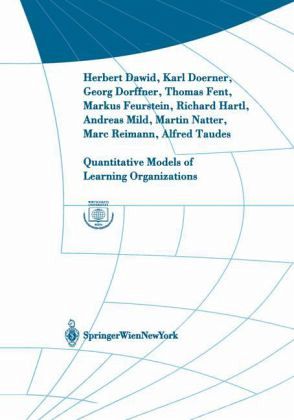Nicht lieferbar

Quantitative Models of Learning Organizations
Versandkostenfrei!
Nicht lieferbar
In a rapidly changing economical environment, quick adaptation is one of the crucial tasks for modern management and permanent learning is a key-factor in the struggle for successfully coping with this challenge. The learning process itself is based not only upon the information gathered on the market, but also upon the totality of knowledge within the company.This book develops a theory of a firm that is based on these principles rather than on optimization and classical equilibrium. It uses quantitative models to describe adaptive firm behavior, the various types of learning as well as vario...
In a rapidly changing economical environment, quick adaptation is one of the crucial tasks for modern management and permanent learning is a key-factor in the struggle for successfully coping with this challenge. The learning process itself is based not only upon the information gathered on the market, but also upon the totality of knowledge within the company.
This book develops a theory of a firm that is based on these principles rather than on optimization and classical equilibrium. It uses quantitative models to describe adaptive firm behavior, the various types of learning as well as various domains of application (organization of new production development, adoption of business models, market entry etc.). It gives an introduction to the various mathematical models of learning and to the applications to problems in microeconomics as well as in business administration.
Th e reader can expect a comprehensive introduction to the subject, its significance for economic theory and managerial practice.
This book develops a theory of a firm that is based on these principles rather than on optimization and classical equilibrium. It uses quantitative models to describe adaptive firm behavior, the various types of learning as well as various domains of application (organization of new production development, adoption of business models, market entry etc.). It gives an introduction to the various mathematical models of learning and to the applications to problems in microeconomics as well as in business administration.
Th e reader can expect a comprehensive introduction to the subject, its significance for economic theory and managerial practice.



